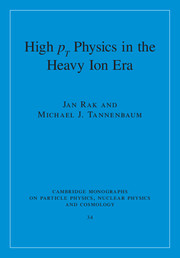Book contents
- Frontmatter
- Contents
- Preface
- 1 Introduction and overview
- 2 Basic observables
- 3 Some experimental techniques
- 4 The search for structure
- 5 Origins of high pT physics – the search for the W boson
- 6 Discovery of hard scattering in p-p collisions
- 7 Direct single lepton production and the discovery of charm
- 8 J/Ψ, ϒ and Drell–Yan pair production
- 9 Two particle correlations
- 10 Direct photon production
- 11 The search for jets
- 12 QCD in hard scattering
- 13 Heavy ion physics in the high pT era
- 14 RHIC and LHC
- Appendix A Probability and statistics
- Appendix B Methods of Monte Carlo calculations
- Appendix C TAB and the Glauber Monte Carlo calculation
- Appendix D Fits including systematic errors
- Appendix E The shape of the XE distribution triggered by a jet fragment, for example, π0
- Appendix F kT phenomenology and Gaussian smearing
- References
- Index
14 - RHIC and LHC
Published online by Cambridge University Press: 05 May 2013
- Frontmatter
- Contents
- Preface
- 1 Introduction and overview
- 2 Basic observables
- 3 Some experimental techniques
- 4 The search for structure
- 5 Origins of high pT physics – the search for the W boson
- 6 Discovery of hard scattering in p-p collisions
- 7 Direct single lepton production and the discovery of charm
- 8 J/Ψ, ϒ and Drell–Yan pair production
- 9 Two particle correlations
- 10 Direct photon production
- 11 The search for jets
- 12 QCD in hard scattering
- 13 Heavy ion physics in the high pT era
- 14 RHIC and LHC
- Appendix A Probability and statistics
- Appendix B Methods of Monte Carlo calculations
- Appendix C TAB and the Glauber Monte Carlo calculation
- Appendix D Fits including systematic errors
- Appendix E The shape of the XE distribution triggered by a jet fragment, for example, π0
- Appendix F kT phenomenology and Gaussian smearing
- References
- Index
Summary
The road to RHIC
The roads to RHIC and the LHC are highly intertwined. The great experimental discoveries of the late 1960s and early 1970s – DIS in e–p, hard scattering in p–p collisions, J/Ψ – inspired a surge of proposals for new accelerators to study the new phenomena. Of key importance in this development were the two major theoretical discoveries: QCD in 1973 as the theory of the strong interactions; and the unification of electromagnetic and weak interactions by the Glashow-Weinberg-Salam model [95-97] a few years earlier. The Glashow-Weinberg-Salam model [100] added two new neutral particles to the unified “electroweak” interaction:
(i) a vector boson, Z0, as the carrier of a neutral current weak interaction, which predicted such previously unobserved reactions as vµ + N → vµ + hadrons, with no final state µ, via the exchange of a Z0;
(ii) a neutral scalar “Higgs” boson which “spontaneously” broke the electroweak symmetry of the gauge theory Lagrangian and gave mass to the Z0 and W± bosons while keeping the photon massless.
Brookhaven (BNL) was first in the accelerator competition [657,658]. In 1971, convinced by the success of the proton–proton collider concept at the CERN-ISR, BNL proposed a 200 x 200 GeV (later 400 x 400 GeV) p–p collider with a high luminosity of L = 1033 cm-2 s-1 using superconducting magnets, the Intersecting Storage Accelerator, or ISABELLE.
- Type
- Chapter
- Information
- High-pT Physics in the Heavy Ion Era , pp. 254 - 301Publisher: Cambridge University PressPrint publication year: 2013

